We started with no experience in gaming companies, which greatly complicated our life and stretched the process from starting work to the first money from games for two and a half years. This is a normal time frame for creating a quality indie project, but we end up with one mobile game of average quality and an income that, although it allows us to at least provide for ourselves, is very far from our goals.
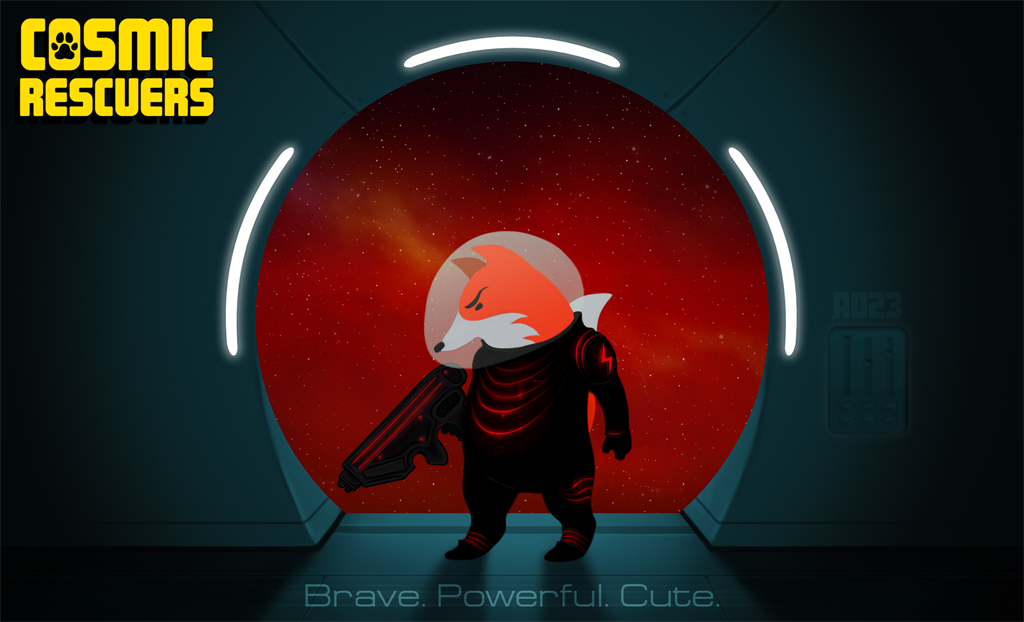
About Us
We are RV Games, a small company of two people.
Max is a programmer and mathematician with over twenty years of experience in his field. I always dreamed of making games and creating my own business. He worked in companies not related to games, and even tried to initiate the development of races within the framework of one of them, but the funding was cut off and the project faded. There have also been attempts to gather people among acquaintances or on freelance exchanges to create their own game, but without much success. However, one of these initiatives marked the beginning of our now alive game - Fitness Gym. We will talk about it below.
I am responsible for the graphics part and most of the game design. From 2011 to 2017, she was freelancing in design and graphics. I only get pleasure when I work on a project in a complex manner (from idea and plan to mechanics and graphics), which brings certain problems: it is impossible to know and be able to do everything perfectly.
We met in the spring of 2013: Max wrote to me on a freelance exchange with a proposal to make a game. The idea quickly faded, and we united again only in February 2017.
There was no experience in creating a full-fledged finished project, so we probably went through most of the possible mistakes of novice developers.
A competent and clear plan was absent in our minds as a phenomenon, so the first "attempts at game development" included "model pictures" and programming, but not interesting mechanics, competent core gameplay and thoughtful monetization. We had the elements of the puzzle, but they were in complete chaos and could not come together in a single picture.
First steps
The first game that has advanced almost to a full-fledged prototype is a 2D platformer tentatively titled Cosmic Rescuers about Baxter the fox traveling from one planet to another to save other animals from invading aliens. We drew and somehow animated Baxter and several enemies, assembled two demo levels and a simple menu of two sections. They even launched some kind of VK ad with videos from the game and got some likes.
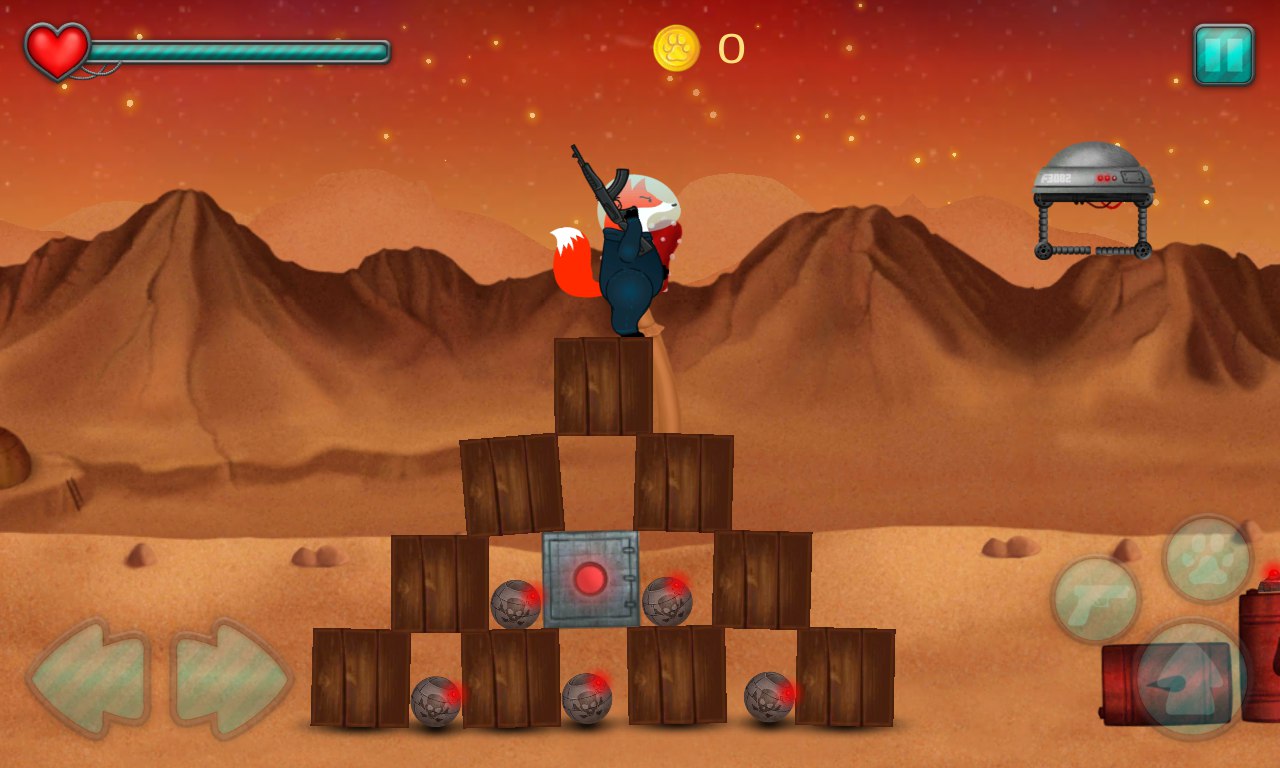
But, like many developers with no experience in launching projects, "out of the blue" problems arose. In the middle of development, the question arose: okay, how to monetize this? We sat, thought, and realized that the two of us would not be able to create a large amount of content for a full-fledged single-player game in which it would be possible to sell, say, access to new planets. More precisely, in the first place I will not pull it, since I am not a professional artist and I will not be able to draw a bunch of levels quickly and coolly. Moreover, the hated freelancing and the need to earn money still hung over me like a black cloud. In addition, with the number of mechanics that were implemented in the prototype, the game is objectively boring and quickly gets bored. I still like a lot of Cosmic Rescuers, so I do not lose hope of finishing (or redoing) it in the future.Of all the projects that we showed potential publishers, game companies and people far from the game dev, it was she who was paid attention, despite the clumsy animation and the shortcomings of the picture in general. Perhaps her time will come yet.
The following projects were initiated by Max. I didn’t know anything about game development and the specifics of the market, so I thought: ok, maybe he understands this better than me, especially since the idea with the fox was not successful. This, of course, was not the case. In everything that does not concern the technical part, his knowledge of how to choose a project and how to draw up a competent development plan did not exceed mine. The next game, which also didn't get far, was a multiplayer team shooter for consoles.Conclusion 1: Even if you work in a small team or alone, you need a clear work plan, documented in the document.
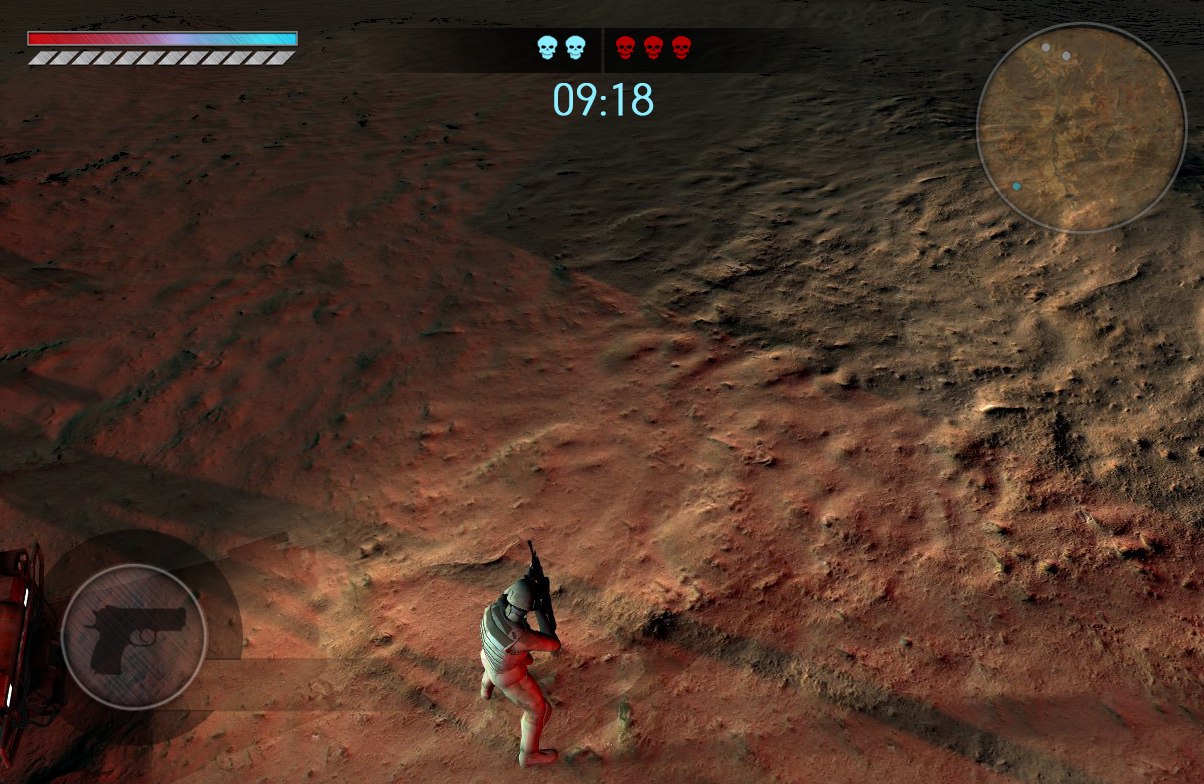
This was probably the most stupid of our endeavors: there is no money for servers, there are similar games from normal companies - darkness, there are only two of us, and I still have no experience in 3D. None. Absolutely. Despite Max's sensible suggestions to buy assets, I decided that I would learn and do everything myself. I sat down to study Blender and the work began ... And, fortunately, it quickly ended when we, albeit not very timely, realized that we could not afford this long-term construction either.
The "project for consoles" was followed by the mobile zombie shooting range Deathcrush. This time, in order to speed up the process, we bought some of the assets: zombies and some weapons. This game has advanced further than the previous ones and was even released in stores.Conclusion 2: Adequately evaluate your experience and the project you are aiming at. It's not a shame to use third-party assets, sometimes it's the only way to bring a project to release in a small team.
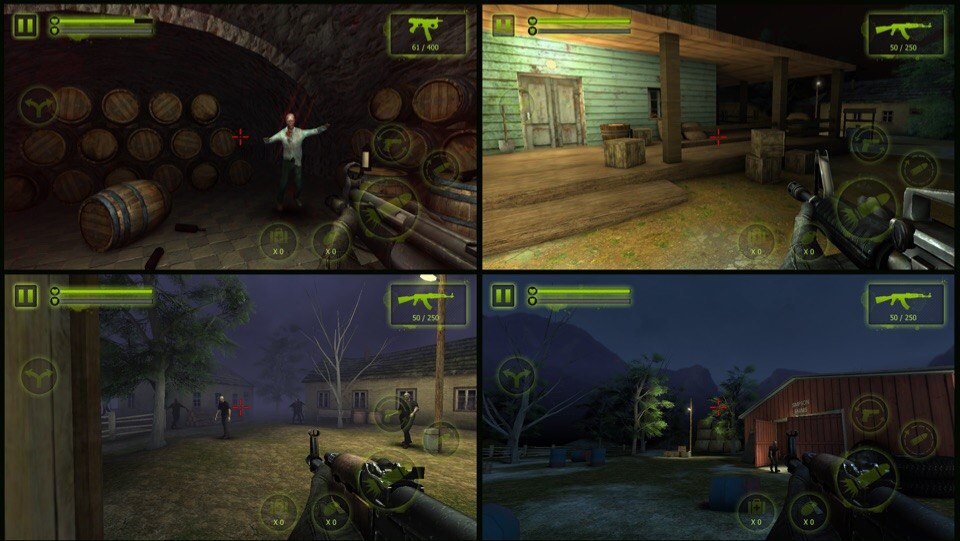
Inspired by the success of Dead Target, which was a low-quality clone of Dead Trigger, we decided that we would definitely do better, which means we will finally make money and wow, we will live! This, of course, did not happen. The zombies in the game were moving too slowly, the game was boring. It completely lacked what shooters need: action and dynamics. Side by side with zombie shooters of all stripes. At the same time, the financial cushion was melting before our eyes, and there was no way to finish this game, taking into account the obvious oversaturation of the market and lack of money for marketing.
Conclusion 3: Market Analysis! How many similar games are there? When were they released? How many installations do they have? Are updates still coming out? Why is your game better?
Money runs out
At the end of 2017, I completely stopped freelancing, having lost not only a headache, but also my livelihood. Max's supplies were also running low. Considering the financial situation, while developing the zombie shooting gallery, we started trying to find an investor. Most foundations, business angels and publishers either refused, or offered to apply again when the game is fully ready, launched, and we have the metrics. Mail.ru Ventures and AppQuantum (which then, it seems, were just starting their publishing activities, so they were more open to dialogue than others) replied that they were interested in a project with movement, not a shooting gallery. And that's not a fact: you guys have no experience with published games.
There was an attempt to reach out to the person who first invested in Tacticool. His assistant showed our demo to one of the developers, who apparently rejected the game because of the graphics, and cooperation also did not take place.
After a while, as we thought, we were incredibly lucky: a businessman from Latvia, an acquaintance of Max's family, agreed to invest in us and even help with relocation. The investments were modest (in fact, the average IT salary in Latvia for each person + a certain agreed amount for marketing). By agreement, immediately after relocation on a tourist visa, he was supposed to hire us in his company to legalize residence, and later we open a joint, now exclusively gaming company.Finding 4: The vast majority of publishers and investors expect project metrics from you. Or understanding that you know what you are going to do and how.
The relocation took place. We rented one apartment for two in the center of Riga and equipped a home office. We started working with enthusiasm and the feeling that we were finally getting out of the swamp. The inspiration did not last long: time passed, and the investor was in no hurry with the paperwork. After about a month and a half, everything was finally ready and we arrived at PMLP (Latvian Migration Service). On the spot, it turned out that the investor's company has debts of several tens of thousands of euros, which means that, according to the law, he cannot hire foreigners. Then we were fed breakfasts and promises of an early solution to the internal problems of his company, and payments began to be delayed until they stopped altogether. Tourist visas have come to an end. There was no money to keep the apartment until the next six months,so we had to leave the tables and chairs we bought and leave.
5: .
:
Before Max and I teamed up in a joint company, he collaborated with freelance artists. Together they made a 2D fitness clicker, but it was never released. In May 2018, at about the same time as Deathcrush, Max decided to release his old game to the store, placing only the keywords in the name - Fitness Gym. If the zombie did not bring anything at all, then sometimes they bought something in the clicker and even wrote laudatory reviews, which surprised us a lot. Of course, these were mere pennies, but at least a minimal interest in such a simple and ugly game made us think: well, maybe, at least it will bring some money, there is to bring it into a human form? It was embarrassing for us that fitness games in the stores were unpopular: they had relatively few downloads and updates stopped shortly after release. But there weren't many options:either accelerate and make another effort in game development at your own risk, or look for a job.
In about 3 months, we created a 3D version of this game with little functionality and released the update on the evening of December 31, 2018. Since then, for about six months, it has brought an absolute minimum, until in July 2019 the Codigames company launched an active advertising campaign for its next fitness game, which at the same time raised our project in the search due to the coincidence of keywords.
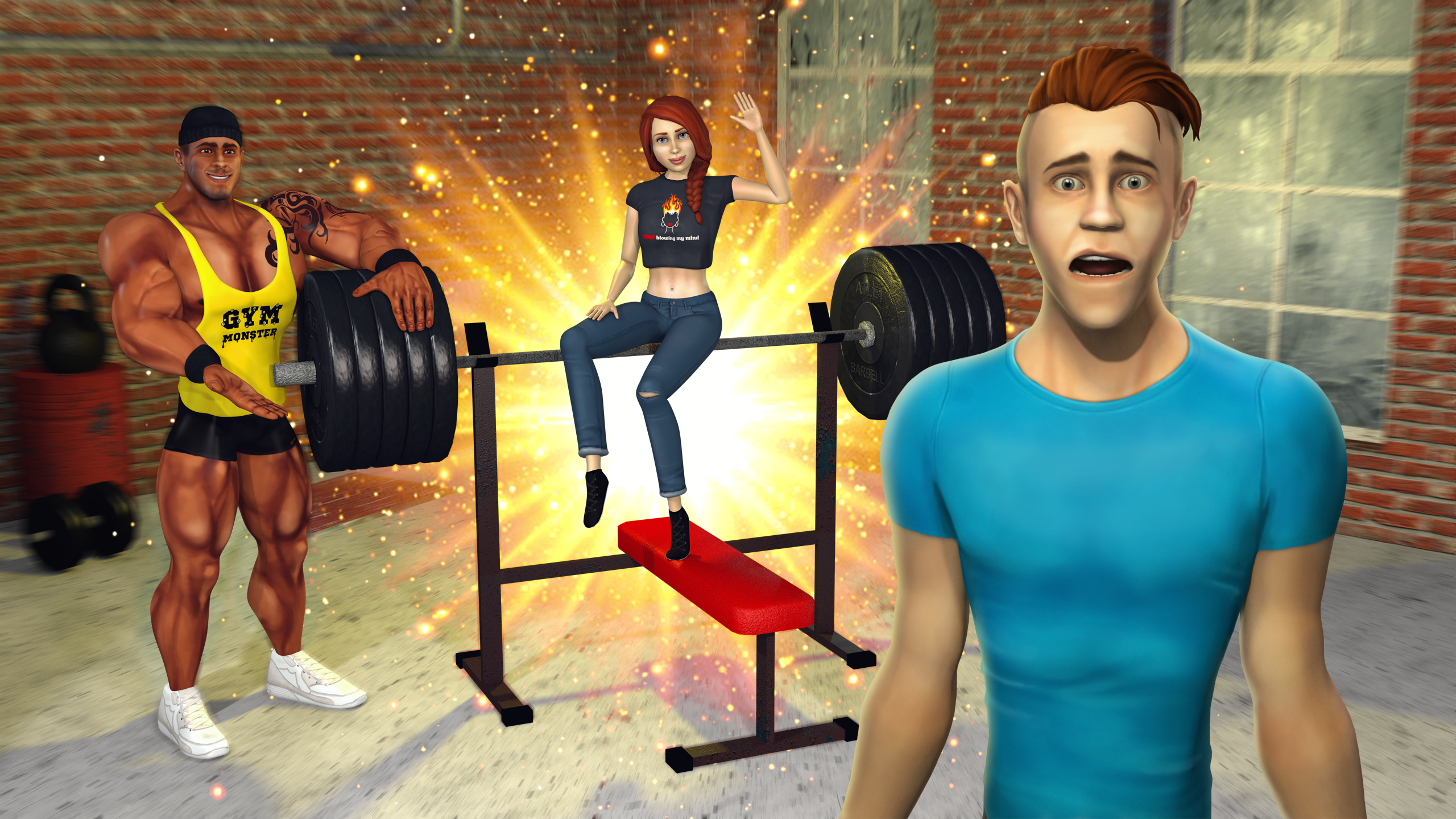
Since then, the rocking chair has grown, has acquired new functions, including boxing via wi-fi, and at the very least provides us, but does not allow us to expand the team or risk investing in servers to implement multiplayer. Due to the fact that in the last year and a half it has been the only source of our income, until recently we could not leave work on it and switch (oh my God, finally!) To a project that is interesting to us ourselves. Every time we were ready to start a new game, the rocking chair showed a sudden rise, and greed forced us to "finish a little more."
But recently we made a strong-willed decision: stop putting up with it! (c) Stop making games that, in the first place, do not insert ourselves. Because of an approach focused on the desire to “make some money” rather than “make money through what you love”, years of work were only possible thanks to reinforced concrete tenacity. It was not useful for maintaining the working mood or for the psyche in general.
We tried to take into account all our experience, tortured over three years of work, and use it in work on a new project. We hope that our experience can be useful to someone else.Conclusion 6: Do what you like. Dragging a project that is not interesting is still a pleasure.